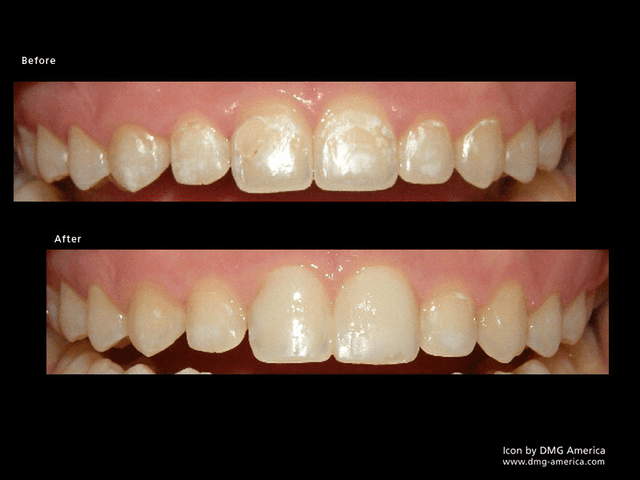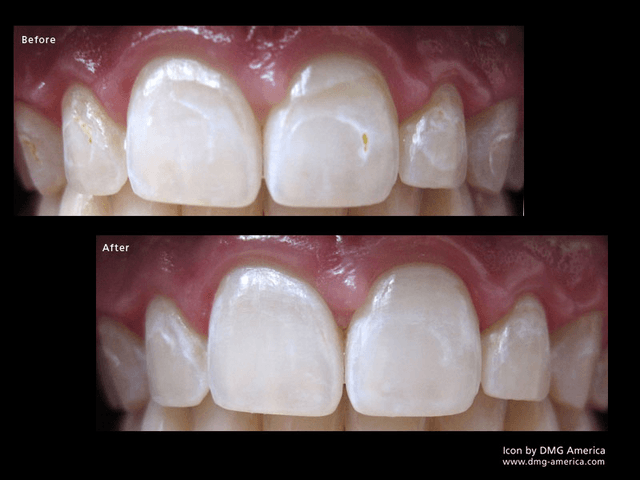
You may have noticed someone that has chalky white spots on their teeth or maybe you have them on your own teeth. Beyond being an aesthetic concern, exactly what are the white spots on teeth? Technically referred to as white spot lesions, there are a number of things that can cause them. At our Naperville cosmetic dentistry and general dentistry practice, it’s a problem we see frequently. Today, we’ll be diving into the causes, as well as solutions for how to get rid of white spots on teeth.
Why Do I Have White Spots on My Teeth?
The two most common causes of white spots on teeth are fluorosis and early decay, though they can also be the result of certain nutritional problems or genetics. Fluorosis occurs when a child is exposed to too much fluoride during the first eight years of their life. When the permanent teeth come in, parents or the dentist will often notice discoloration, including white spots.
The other cause is decalcification, which is the first sign of tooth decay. Essentially, white spots on teeth are often early cavities, which is why we sometimes call them cariogenic white spots. White spots on teeth after braces are extremely common. Plaque tends to accumulate around the bracket and it’s hard to reach it to brush it away. When it sits there, the plaque acids cause mineral loss underneath the surface enamel of the tooth. This causes white spots to form where the brackets once were.
How to Get Rid of White Spots on Teeth
We know discovering white spots on teeth after braces is especially disheartening because you went through the effort to get a perfect smile. When the big day arrives, and your brackets come off, the last thing you want are white spot lesions ruining the show. The good news is, there are ways to remove white spots on teeth and help you reclaim your smile, regardless of the cause. Here are some of the treatments for white spot lesions:
- Prescription Paste – A prescription product called MI Paste, which is the commercial name for casein phosphopeptide-amorphous calcium phosphate, or CCP-ACP, and sodium fluoride (NaF) may both help remineralize white spots. However, researchers are still looking into the treatments and they tend to work better when used preventatively.
- Remineralization – Some dentists offer remineralization treatments after orthodontic treatment, such as a fluoride varnish. Remineralization replaces the minerals that were lost due to the plaque acids and should, theoretically, stop the decay from progressing and help even out the appearance of white spots. While one study did show that fluoride helped reduce the appearance of white spots on teeth after braces, more research is needed and it might not give you the dramatic results you’re looking for.
- Icon Infiltration Technique – Icon infiltration is a cutting-edge way to gently treat white spots on teeth without needles or drilling. Research has shown that resin infiltration is more effective than CCP-ACP and fluoride in the esthetic improvement of white spots. We offer Icon caries infiltrant in Naperville at our office. We inject a highly fluid resin into the enamel where the white spot is. It makes its way into the tooth’s pore system and it fills the area, quickly stopping decay and esthetically blending the white spots so they match the rest of your enamel. The infiltration technique also has the added benefit of preserving your tooth and increasing its life expectancy.
- Veneers or Composite Fillings – As a last resort, veneers, composite fillings or bonding can give you the even, white smile you want. However, since a treatment like veneers will involve filing down healthy teeth, it’s best to try less invasive options first, such as the Icon infiltration technique.
Ways to Prevent White Spot Lesions
You can prevent white spots on teeth after braces, or at any time in your life, by following these tips:
- To prevent white spots on your child’s smile, avoid excessive fluoride. Talk with your pediatric dentist about how much fluoride your child should be getting before adding any topical fluoride products to the mix.
- Practice good oral hygiene, especially when you’re wearing braces. Brush using an electric toothbrush in the morning, after meals and before bed. Be sure to floss once daily as well. If you need a little extra help cleaning around your braces brackets, use an interproximal brush or a water flosser in addition to your toothbrush and dental floss. These tools are good for getting in tight spaces and around brackets.
- Watch your diet. Acidic foods and drinks, including citrus fruit, sports drinks, soda, white wine and fruit juice eat away at your tooth enamel and can increase your risk of getting white spots. Try to enjoy these types of foods and beverages in moderation.
- Ask your orthodontist or dentist about topical fluoride. If you’re at a higher risk for cavities or white spots, they may prescribe a special fluoride rinse or toothpaste or apply a fluoride varnish in the office.
If you’re unhappy with the white spots on your teeth, we can help! Schedule a visit at Naperville Dental Specialists today and learn about how we can remove white spots on teeth and restore your smile with the Icon infiltration technique.


































